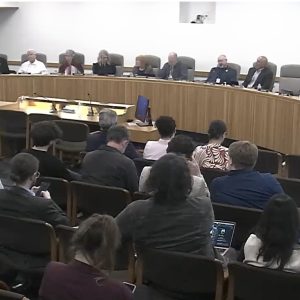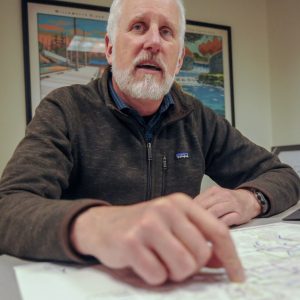“We can see a return on our investment tomorrow that far exceeds our investment today… This can be our ‘great bridge’.”
— Rep. Tobias Read
By a vote of 45-11, the Oregon House of Representatives voted this morning in support of HB 2800. There was not much debate about the bill, and except for an extremely critical take-down of the project by northeast Portland Democrat Lew Frederick, it sailed through with glowing praise.
Only two Democrats in the entire Oregon House — Reps Lew Frederick (NE Portland) and and Carolyn Tomei (Milwaukie) — voted against the project.
The presentation of the bill in the House chamber began with co-chairs of the Joint Committee on I-5 Bridge Replacement Cliff Bentz (R-Ontario) and Tobias Read (D-Beaverton).
Bentz pointed out the many “triggers” in the bill that he said must be fulfilled before the state treasurer can issue bonds and construction can begin. Those include, said Bentz, a cap of $3.4 billion in project cost, an investment grade analysis of tolling revenue, a permit from the U.S. Coast Guard, a $450 million commitment from the State of Washington, and so on. Backers of the project say the triggers are rock solid; but critics still question the vague language and accuse its authors of legislative slight-of-hand. “These are toothless triggers,” said economist Joe Cortright in an analysis of HB 2800 published on Portland Transport this morning.
While Bentz focused on the bill’s details, Rep. Tobias Read’s job today was to make the emotional pitch. He said there’s bound to be “some level of uncertainty” with a project this large, but that, “If we don’t act, problems increase and solutions only get more expensive.”
Rep. Mitch Greenlick (D-Portland), who had been a rare outspoken critic of the project and had even introduced a bill that would stop funding it entirely until the state could prove it could be built and financed, voted yes on the project. He was pleased that HB 2800 included some the funding triggers outlined in his bill and said he was appreciative of the “kind of debate we’ve had on this.” “That leads me to a reluctant yes on the bill.”
Then northeast Portland Rep. Lew Frederick spoke and made his position clear from the get-go. “I remain disturbed about this project and plan to vote no,” he said, “As all the neighborhood associations in my district have asked me to.”
“I’m not against doing something,” Frederick said, but he proceeded to eviscerate the project’s PR machine and laid out his case on how it would negatively impact his community’s public health.
“My district is bound on the south and west by freeways. My people bear a heavy burden from these freeways. Their neighborhoods were razed for I-5 without any or too little compensation. Their neighborhoods have high levels of pollution and respiratory diseases and that’s a big deal to me and the residents in my district. We have the highest asthma rates in the state.”
Frederick even brought up the Mt. Hood Freeway, a 1970s freeway project that was thwarted by neighborhood opposition — but not before authorities re-located people’s homes to make way for construction that never happened. He criticized the CRC’s massive PR effort. “The public process struck me as… a con. Residents were shown a preferred scenario next to scenarios that looked unreal or ridiculous… I have a lot of planners in my district and they called that out early.” Frederick accused project staff of going into neighborhood meetings with a “predetermined outcome” in mind and said he felt decisions were being made “more by momentum than by problem solving.”
Here’s video of Frederick’s speech:
One Rep (whose name I did not catch) dismissed concerns and questions raised by critics of the project, saying that it’s rare for an undertaking of this size to please everyone. That “It’s not perfect, but nothing ever is,” type of talking point has been repeated often by CRC backers in recent weeks. “We cannot let perfect be the enemy of progress,” said the Rep, who voted yes.
Rep. Jeff Barker (D-Aloha) veered from the carefully crafted script given out by project backers and Governor Kitzhaber who want everyone to think of this solely as a bridge project (even though only 30% of the cast pays for a new bridge). “I’m voting yes on the bridge bill — or, the highway widening project if you will,” he said.
In closing remarks, Rep. Read said people have been working on this project since 1999 and that it’s been “well-vetted and well-considered.”
“It’s easy math,” said Read, “We can see a return on our investment tomorrow that far exceeds our investment today.”
He then brought up The Great Bridge, a book by historian David McCullough about the Brooklyn Bridge in New York City. “I realize this is not New York City,” he said, “But I can saw with a high degree of confidence that this project and this bridge can play a significant role in the revitalization of our region. This can be our great bridge.”
—
The bill’s next stop is the Senate where it’s scheduled for a first reading tomorrow. A vote is likely to happen by next week. Stay tuned.







Thanks for reading.
BikePortland has served this community with independent community journalism since 2005. We rely on subscriptions from readers like you to survive. Your financial support is vital in keeping this valuable resource alive and well.
Please subscribe today to strengthen and expand our work.
I wish they’d stop talking about the bridge as if that’s the only thing affected. Unfortunately, diverting attention away from the mega-freeway that will gut the center of the city will work for those who have short attention spans.
Really? Having aslightly less trafficked on drive on the way to Vancouver (mainly during rush hours) is going to revitalize our economy? With the TEMPORARY construction jobs? For the passing through trucks that should be using 205 anyway?
architects’ critique: Columbia Crossing: What Does It Mean?
from PDXplore http://vimeo.com/12030259
That PDXplore was a great event, well worth watching again. We needed (and still need) more of that kind of thing.
Huge thanks to Rep. Lew Frederick and Rep. Carolyn Tomei.
They should get a lot of thank you letters; considering the power structure pushing the CRC, what they did was courageous.
A great place to write letters, raise spirits, and raise funds for the continuing fight (in Senate, Washington and in Court) is at the party tomorrow night: https://www.facebook.com/events/488237544544910/?sid=0.4736211036797613
(And another party, the following Tuesday, March 5, 5:30-7:30pm, at Velo Cult Bike Shop and Bar at 1969 NE 42nd Avenue, Portland).
I am disappointed. I was expected that the CRC bill would be passed it. Carolyn Tomei is my rep. I emailed her that I was opposed the bill last Friday. I dont know if she was opposed it beforehand but she had better senses than the most of reps.
We already have decent bridge nearby that is I-205. I-5 does not have much room for expansion. IMBO
Sounds to me like the so-called “triggers” are mostly toothless:
1. A cap of $3.4 billion in project cost: There are estimates and there is reality. They can keep estimating the project at $3.4B if they want, and the project will go forward. Even if the actual cost ends up trending towards $8B (as I fear it will), once physical work has begun no one is going to have the guts to pull the plug, and the difference will have to be made up by cutting other, more important projects.
2. An investment grade analysis of tolling revenue: They’re only requiring that the analysis be done, right? So even if the analysis shows that tolling revenue will be lower than the earlier rosy projections, so what? The trigger doesn’t require that tolls contribute a specific share of the revenue, just that the analysis take place. Again, if tolls come up short of projections, they’ll have to cut other, more worthy projects to make up the shortfall.
3. A permit from the U.S. Coast Guard: This is the one potential hitch, and the bridge-height requirement could still force an (expensive) project change or cancellation. But the USCG is still part of the federal bureaucracy, and potentially subject to political pressure. Ultimately they’ll probably cave.
4. A $450 million commitment from the State of Washington: Slam dunk.
Yeah this is great news! Why? Because I would like to take the MAX to Vancouver, WA which is about the only way that is going to happen 🙂
I hate to say I told you so….
Time to start planning strategies for making sure there is light rail and a bike boulevard.
I think the goal should be to make it the best possible bridge biking and light rail now. We don’t want to be left out the planning process going forward. It would be too easy for backers to say “Why do we need bike access? That is to expensive, this is for freight.” We need to ensure that bikes are included. We don’t want another bridge like the ones in the valley without bike access.
Except the question is, “is it progress at all?” That’s what most of the opposition has been asking – not, “we don’t like it!”
Rep. Read’s “easy math” is also the wrong math.
First, the costs hit the poor and those near the neighborhood, while the profits go to the highway lobbyists and others. So to pile it all together, as if everyone will be affected the same way, is wrong and immoral.
Second, the right question, per economists, is how do we maximize net benefits? There are many different things we could do with that money (including things like the Common Sense Alternative) that would have higher net benefits.
Third, he makes an assertion – with nothing to back it up. Given induced demand, the continued congestion, and the costs of the climate crisis, my back of the envelope math is we lose on this deal. The climate crisis is projected to cost the world 5-20% of its GDP.
But we’ve long known where Rep. Read’s allegiances lie.
@Evan Manville,
The “Common Sense Alternative” may indeed be a fine plan. But it simply cannot be built; there are no deep pockets to pay for it. The CSA would not be an Interstate highway, so no FHWA funds. It for sure would not provide much benefit to the rest of the State of Washington, so no buckos from Oly. And it wouldn’t provide any benefit AT ALL to Oregon, just make the Port of Vancouver a more effective competitor to the Port of Portland. So nada from Salem.
Hence, no cavalry over the ridge. And if you think that the good burgers (deliberately misspelled) of Clark County want to participate in paying for their commutation relief, I’ve got a bridge over on the Atlantic Coast I’ll sell you. They don’t want to put one red cent of their money into whatever is built.
Since we would be the prime beneficiaries of a new bridge — the “it’s for freight!” argument is just a diversion — by all rights we SHOULD pay for most of it. But that ain’t gonna happen; even if the “let someone else build it” Tea Partiers in Vantucky had a change of heart (LOL! What heart?) we don’t have enough industry to tax to build it over here. The POV is a government agency, so no blood in THAT turnip.
“It’s easy math,” said Read, “We can see a return on our investment tomorrow that far exceeds our investment today.”
Prove it.
Seems to me that the only proven investments are those provided by foreknowledge (cough up the time machine) or insider trading.
Somehow corruption seems like the more realistic option.
The hard part (perhaps too hard) will be for the biking community to come back to the table and try to participate in the process. Stubborn opposition has brought us this far, perhaps a change of strategy is in order. If going forward, only vocal opposition is heard from cyclists then we can expect very little that we like in the end. As I have said before, this thing is going to happen. Let’s not lose the opportunity to make it the best it can be, it will be here for a long time!!!
Can this be stopped by referring the measure and/or an initiative? I understand there’s an “emergency” clause that could prevent referral. Is that true? Can that be challenged in court? If not, how about an amendment to the state constitution preventing such a mega project without a vote of the people of Oregon? If not, how about just an advisory measure for the state or just PDX. Seems like the feds/leg/gov would have trouble still ramming it through if it failed a public vote.
The Senate vote is set for Thursday. Feb 28th.
Here’s one link to everything, HB2800, phone numbers, and all the facts to fight the CRC
http://tinyurl.com/csatalking
Please call your senator, and call 5 friends. The only thing that will stop this is friends calling friends to act. Out of 30 senators, 15 can be persuaded to vote no.
Posted 8:39pm Feb 25th.
“If we don’t act, problems increase and solutions only get more expensive”
Ha ha ha ha ha ha. That’s a good one. And what does it mean in this context?
Even more expensive than the CRC? We’ve never heard of anything that is more expensive in this state. Care to elaborate?
And now Mr. Read is comparing this to the Brooklyn Bridge? Revitalization of the region? Someone please point out to Mr. Read that, unlike New York City in 1869, we already have a bridge over the Columbia, no make that two bridges (or three if you count the rail-bridge). Instead of reading coffee table books I’d like to suggest that Mr. Read (who likes to suggest lunch dates) make a trip to NE Portland to meet with Lew Frederick ‘s constituents who live where this nonsense is to be built (don’t count on it) for lunch. I bet he’d learn a thing or two.
Also if you happen to plug the cost of building the Brooklyn Bridge into an inflation calculator ($4,500,000 in 1869-1893) you get $76M in today’s dollars, or roughly half of what taxpayers have already spent, um, doing we don’t know what exactly. Maybe Mr. Read should compare the building of the Brooklyn Bridge with the studying of the CRC. That would make a page turner of a book, I’m sure.
But of course the CRC is not (about) a bridge at all, which might explain some of the other differences between these two examples.
Speaking of the Brooklyn Bridge, a reproduction of the the Brooklyn Bridge, or a bridge aesthetically evoking that bridge, with some upgrades for modern traffic needs, across the Columbia River between Portland and Vancouver, rather than the bland gargantuan monstrosity being planned for that location, might be worth spending some money on.
The ugly blot on the landscape that aesthetics and physical impacts of the proposed CRC bridge complex design seem destined to leave, aren’t the grand, majestic, positive qualities NYC’s Brooklyn Bridge with its spires, towers and graceful, very functional design, provides that city, Brooklyn and Queens.
CRC supporters seek to hand residents of neighboring states, Oregon and Washington, a pig in a poke. It’s not just ugly…it’s likely to actually create more problems than the current bridges do.
Wow, so many Portland politicians to never vote for again!
welp, there goes the neighborhood…or several neighborhoods.
“He then brought up The Great Bridge, a book by historian David McCullough about the Brooklyn Bridge in New York City. “I realize this is not New York City,” he said, “But I can saw with a high degree of confidence that this project and this bridge can play a significant role in the revitalization of our region. This can be our great bridge.””
AAAAHHHHH This is maddening! This is not a “great bridge” by any stretch of the imagination. I hate when people twist others words. I can’t believe that man is now the representative for the district I grew up in, where my mother still lives. When looking for images of the project on the CRC website last week before testifying in front of the joint committee I found next to nothing. Jonathan also pointed this out in his before and after animation from a few days ago. If the design was something to be proud of there would be images all over the CRC website. Instead, the only images that can readily be found show traffic backed up on the I-5 bridge. Contrast this with the website for the new east span of the San Francisco Bay Bridge which has tons of images showing renderings of the new span. THAT bridge has an aesthetically pleasing design people can be proud of.
To: Tobias Read: A great bridge? Hogwash. Don’t believe everything you think. As designed and redesigned it will an ugly concrete behemoth. Do you think pictures of it will be taken and put in magazines? Do you think it will be used in movie scenes? ha ha. What a laugh. Portland will never be New York, San Francisco, Seattle, so get over it.